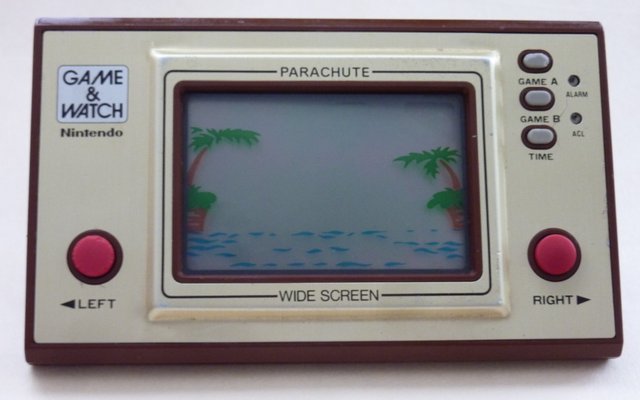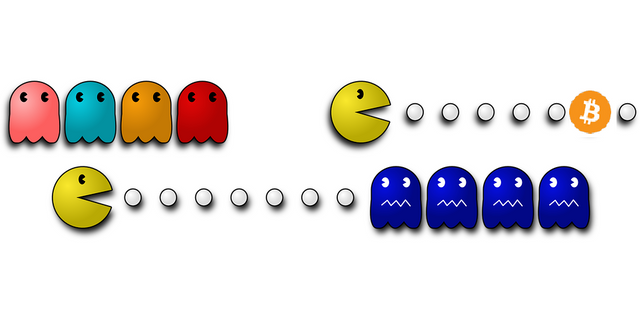How to: Win the game of cryptocurrencies - Part 1
Part 1 - History and important background information
This topic is close to my heart. I'm a gamer. Ever since I could first reach the controls of a video game machine (standing on a step at first), I've been gaming. I saw the rise of home PCs. I've played games on Commodore 64s and XTs; with monochrome monitors; without a mouse. I used little Nintendo "Game & watch" handheld games that featured an entire two control buttons!

By Orlando105 [CC BY-SA 3.0 ], from Wikimedia Commons ; (I used to play one exactly like this for hours!)
I remember the technological leap that the original Nintendo GameBoy was. I've used ancient gaming consoles and their cartridges (yes, I blew on the contacts to get them to work - no, it didn't help). I remember when the Sega Megadrive was released as shiny new technology (long before Sony ever invented the name "PlayStation"). And I've been gaming ever since - being a part of everything between then and now.
These days I don't get the sort of time that I would like for PC gaming (so much for this whole overrated "adult" thing!) - so I dabble in the odd Android game on my phone; but really I don't count that as gaming. I've used consoles too, but I don't like them. I know there is fierce debate on this topic, but I consider PCs to be far superior, for reasons that are too numerous to mention and which are beyond the scope of this post (at least for now; in the follow up post/s we will see just how wrong I am!)
The point is - I know my games
This part is about the history of gaming and specifically - how games have been bought and how the method of buying games changes over time. Part 2 will deal with how Cryptocurrencies and games work/will work, how much money is in the industry and which direction is it moving in. Depending on how long Part 2 gets, I may further subdivide it.

From https://pixabay.com/en/pacman-pac-man-computer-game-148906/ ; Modified by Bit Brain
How to: Win the game of cryptocurrencies - Part 1
The history of buying games: a personal perspective
When I was a kid, all games were free. Well... they weren't actually free I guess, but we all treated them as if they were. Games were copied and transported from PC to PC on old 1.2 MB, 5.25" floppy disks (before those fancy little 1.44MB, 3.5" variants came into being). Older systems used cassette tapes... Some PCs didn't even have hard drives (Young people: I swear I'm not making this stuff up!).
As games became larger, copying them on floppy disks became increasingly difficult. I remember copying a 130MB game using only WinZip and a stack of about 30 disks (creating a spanned disk set - anyone remember having to do that?). We would erase a disk, zip information onto it, pop it into the other PC, unzip it and repeat. I remember losing a 50MB video file in the process, a file I decided we could do without! (The game still worked).
Eventually salvation arrived in the form of compact disks. 700MB of space was a game changer. Around the same time I started earning my own money and could buy games of my own. Of course we still copied a few between one another - piracy being something that only happened at sea when people with swords attacked boats. CDs were bought at the handful of game distributing stores or at large general purpose stores or newsagents with a "Games" section.
Eventually CDs also became too small, even in boxed sets. DVDs replaced them. Going to a store to physically buy your games was still common, but around that time, another way came into being: you could order games online. The first game I ordered in this way was Sonalysts: Sub Command - a 2001 title (which I ordered a few years later after finally locating a copy).
Then life became even easier. High speed internet connections made it possible to download the games you wanted. Platforms dedicated to this sprang into being: Steam (with an "a"), Origin, UPlay... An on-line purchase and an overnight download (the duration of which depended on your connection speed and the game size) secured you your game, the license of which was linked to an online account. During this time, phones started to get decent graphics chips in them, and people started to play more than just "snake" on their smartphones while they waited in queues, got bored at the opera, goofed off at work etc.
A new way to sell games was needed, something that would work with phones (and tablets etc) as well as with computers.
Enter the world of microtransactions
DLCs became the order of the day. DLC = Downloadable Content - extra add-on content for games that you already own. You've already bought the game, now please pay even more for the rest of it... This was not always popular and drew criticism (especially after it became exploited by developers), though you can still find it in common use today.
Then FREE games became popular. Titles which are free to download and play (some are even played in your browser - no download necessary), all you need is an account and a device to play them on. Until that is, your city runs out of gold and you want to upgrade your castle - $1.50 paid through Google Play will quickly sort that out for your phone game. Or perhaps you want the latest aircraft for your PC flight simulator before the special discount ends at midnight - $29.99 will make that happen for you.
"Microtransactions" are now taking place on a continuous basis. I play many games, both phone and PC, in which the users supply a steady stream of USD to the game developers. It's always a castle here, a speed bonus there, a new sword for a hero, a new outfit for a character... whatever the player can afford at the time to pay towards their never ending desire for supply driven content.
Which brings us to crypto
Cryptocurrencies are the next logical step in microtransaction evolution. In the next post/s we will look at why I say that.
We will also look at:
- The different types of gaming cryptos and briefly describe what they are.
- See how they make money.
- look at how much money is in gaming, how big is the industry.
- See which gaming coins Bit Brain has bought (and why).
You're not off the hook just yet...
Games are BIG money - the reason I am writing this post. If you are not familiar with the industry then do yourself a favour and watch this, or at least the first few minutes of it; just to give yourself an idea of what sort of popularity gaming now commands and will command in the future.
See you tomorrow!
Yours in crypto,
Bit Brain
Published on

by Bit Brain

Gaming and blockchain are a match in more ways than one! Like you say the microtransactions and paid content will play a big role for starters, but I think the whole model might change.
Of course we know pay-to-play, and you mentioned the freemium model as well. But I think with blockchain underlying games, we might even see a new model arise: Paid-to-play, which similar to how Steemit works, doesn't cost money but actually pays the player for playing the game.
How it would work best I'm not sure, there are multiple ways, from mining in minecraft-type games to just finding loot on monsters. I think there were already gold-farmers in games like World of Warcraft, but it's going to be insane in the world of tomorrow. Who knows, jobs might actually migrate to online virtual worlds... instead of chopping down trees in real life, we will be chopping down trees for lumber in minecraft games, to sell to virtual consumers? If virtual money has value then perhaps virtual lumber does too.
That does happen, not with e.g. lumber, but rather the creation of accounts, levelling them up and reselling them. Child labour or bots at their horrible best. I have old game accounts which could probably sell for a small fortune.
Great trip down memory lane! Blockchain is so revolutionary and ita potential will be seen in various places but agreed that here it is definitely a great match to develop.
Indeed there is. Stay tuned for the next episode.
Wow, you brought back a lot of memories with this post..LOL.
Yeah, I was getting pretty lost in nostalgia writing it!
Great post, so many memories I forgot I had - can't wait for Part 2.
Glad you enjoyed it, thanks for the comments.
To listen to the audio version of this article click on the play image.

Brought to you by @tts. If you find it useful please consider upvoting this reply.
Congratulations @bitbrain! You have completed the following achievement on Steemit and have been rewarded with new badge(s) :
Click on the badge to view your Board of Honor.
If you no longer want to receive notifications, reply to this comment with the word
STOPTo support your work, I also upvoted your post!
Your posts are just amazing. I don't know why you still have such a low reputation!
Thanks, I'm working on the rep, but it's slow going. I work all day and a single post takes many hours. Steemit rewards quantity over quality - unfortunately. And apart from an experiment or two, I don't use bots.
i remembered those 5.25" floppy disks man went my friend hse to copy the files and some of them took so many disks. thumbdrive and cloud storage are so convenient now =)
i was a hardcore gamer in the past, spend so much time and resources on them especially world of warcraft and dota and mobile gaming last few years. Wish i could have use those time and resources on btc earlier haha or maybe steemit 2 years ago.